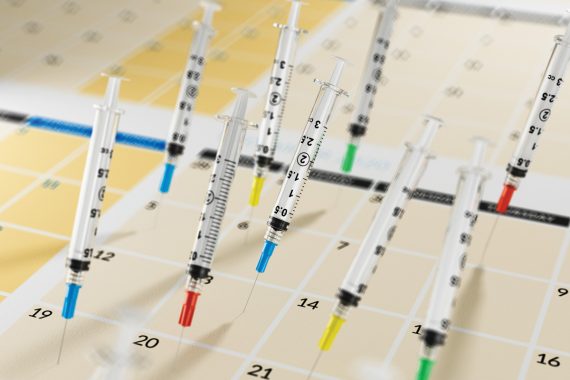A second Covid-19 vaccine, by Johnson & Johnson, has been linked to rare blood clotting, leading to a pause in its rollout this week in the US, South Africa and the EU.
The Johnson & Johnson Janssen vaccine was linked to six rare blood clot cases after more than 6.8 million doses of the jab.
It comes as Denmark has announced it will become the first country to permanently stop using the Oxford/AstraZeneca vaccine, following its links to blood clots.
Meanwhile, Public Health England (PHE) has updated its advice on blood clotting following Covid-19 vaccination, saying if patients under the age of 30 choose not to have the AZ vaccine they may have to ‘wait for other supplies’.
In the blood clotting cases following the single-shot Janssen vaccine, symptoms in the six patients recorded all appeared between six and 13 days after the vaccination.
The European Medicines Agency (EMA), which is investigating the vaccine and clots, stressed that it is ‘currently not clear’ whether the events are linked to the vaccine. It said it will decide whether ‘regulatory action may be necessary’ once the evaluation has concluded.
The UK’s regulator, the Medicines and Healthcare products Regulatory Agency (MHRA), has not yet approved the vaccine for use in the UK, but the Government has bought 30 million doses.
Dr Siu Ping Lam, MHRA director of licensing, said: ‘Vaccine safety is of paramount importance and we will monitor and evaluate any safety reports received promptly and robustly before a decision is made, working and sharing safety data with international regulators as necessary.’
Meanwhile, in newly updated advice for healthcare professionals on blood clotting following Covid-19 vaccination, PHE said last week:
- Patients under 30 may have to ‘wait for other supplies’ if they choose not to take the AZ vaccine after discussion with a clinician
- Patients should not self-medicate with aspirin prior to or immediately after AZ vaccination, unless it is part of their ‘regular’ medications – while it ‘may be used to reduce clotting risk in other conditions, it is not currently thought to have the same effect in this condition and may in fact worsen the outcome by increasing the risk of bleeding’
- The AZ vaccine is contraindicated for those with a history of ‘other extremely rare immune-mediated syndromes that are characterised by thrombosis in combination with thrombocytopaenia’
- However, those with a history of thrombosis or thrombocytopaenia alone, or bleeding disorders can still be vaccinated with the jab, along with the over-30s with past clotting episodes or thrombophilia – whether or not they are on long-term anticoagulation
After establishing an ‘extremely rare’ blood clot risk, the Government last week said under-30s should be offered an alternative Covid vaccine to the Oxford/AstraZeneca jab.
But GPs warned of unintended consequences of the vaccine advice, including creating ‘panic’ among patients and adding to the workload of already pressured practices.
Earlier this week phase 2 of the vaccine programme rollout began, with those aged 45 and over being invited to receive their jab.
GPs were told by the Joint Committee on Vaccination and Immunisation (JCVI) to encourage men and those who are obese or working in professions with higher risk from Covid to have their jab.
However, the JCVI said these groups will not be prioritised and no alternative to the AZ vaccine will be offered to the over-30s.
Pulse October survey
Take our July 2025 survey to potentially win £1.000 worth of tokens













